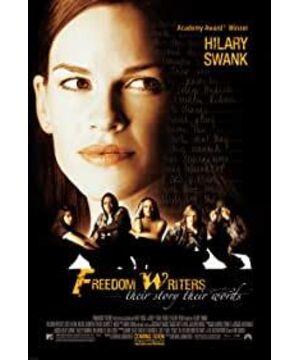Ms.G may never take the student's diary as a gift, but when she opened the cabinet door nervously for the first time and saw the students' diaries piled up there, she must have been overjoyed as if she had received a gift. This special gift is not a scent of blessing and praise, but is filled with memories of humiliation, hatred, and despair. The children repayed the trust Ms.G gave them by breaking the silence. A child wrote in his diary: "I have lost many friends who died in unannounced wars. For those soldiers and me, this is worth it." Such words lingered in his heart for a long time. At the moment when the words were formed, he was free. The past experience can no longer trap him. While telling himself, he also re-recognizes himself and the past.
This same child, when faced with Ms. Miep Gies, who saved the Jews during World War II, he said: "I have never seen a hero, but you are my hero." What is changing? The children of these gangsters were once staunch supporters of racial violence. When Ms.G mentioned the history of the Holocaust for the first time in class, they applauded the means to exclude dissidents. However, when they saw in the museum how the heinous massacre happened and how many innocent children were deprived of their lives as a result, the students finally understood why Ms.G said that all crimes came from a picture with race. The discriminatory comics began. These young people need to choose whether to leave the world with the baton of constant provocations and conflicts, or to end the violence through free writing.
Ms.G is undoubtedly an idealist, and the practice of idealism has never been smooth sailing. The school did not agree with her to read new and good books to the students for fear of wasting teaching resources. She worked part-time to raise money, buy books for the students, take them on trips, and invite Holocaust survivors to communicate with the children. This seems to be far beyond the scope of a middle school teacher's responsibilities, and even her most trusted father and husband cannot understand these actions. Under the rigid education system, her "abnormal" is also intolerable by other teachers. But in the eyes of the children, Ms.G "Once you make up your mind to do something, nothing can stop her." This process is not without pain. The difficulty in adhering to the ideal lies in whether you always believe that all your efforts are meaningful and effective. What if it can't change the lives of the children? What if there is no authoritative support? Ms.G did it, and her story was put on the screen. However, some idealists who are engaged in education work that I know are not so lucky. For example, one of my middle school Chinese teacher recommended us to read "Southern Weekend" and encouraged us to write poems in the weekly diary. He even recited his poems in class to mourn the passing of Ai Qing to tears. But one year after I graduated, he left my alma mater and stopped teaching as a career.
I don’t know if this teacher, like Ms.G, tried to inspire us ignorant teenagers to express the initial sense of freedom in our hearts, but I know that after 7 years of leaving his classroom, there are some things he broadcasted. The seeds that were planted became beautiful flowers. I have never experienced the thrilling youth of the children in the movie, but I know that suffering is the same, because human history has only a common period, which is the alternation of darkness and light, and ultimately requires people to emancipate and redeem themselves. Therefore, whether in Los Angeles or Nanjing in the 1990s, a middle school teacher can stand on the podium and say in the name of freedom: "You are not just children sitting in the classroom, you are writers with your own voice and stories. "
I would like to dedicate this article to every teacher in my 26 years of life, and I wish a happy Teacher's Day.
View more about Freedom Writers reviews











